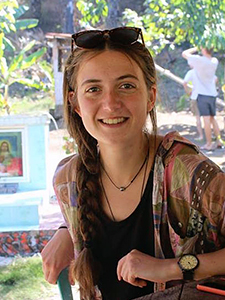Charlotte Pizer Profile

What year did you graduate?
I graduated from my BSc in 2017 and from my MSc in Research in 2019.
What subjects did you study prior to arriving in Durham?
I chose to study the International Baccalaureate - so I did pretty much every subject APART from geography. My class was too small to offer geography so I had to do 'environmental systems and society' instead, which actually gave me a really good handle on the human / physical crossover modules in first year.
Which degree programme did you study at Durham and why?
I knew I wanted to study something physical geography / ecology based that would incorporate field-based learning with labs and lectures too - so I did a Bachelor of Science in Physical Geography and chose Durham because I had looked into their field trips and year abroad programs and thought the locations were pretty impressive!
What were the highlights of studying at Durham?
I guess it seems silly that my Durham University highlight would actually be my year abroad but it was so fun and has opened so many doors for me. I studied a replacement year (2nd year that counted) at the University of Otago in New Zealand, which allowed me to experience a really broad spectrum of subjects as well as a completely different university lifestyle. It also made me appreciate the world-class level of teaching and resources that is accessible at Durham, as it is certainly not the same at other universities I have visited.
[NB: Instead of a replacement year, Geography students can now take an addition year abroad between the 2nd and 3rd years of the Durham programme].
What was the topic of your third-year dissertation?
Analysis of mid-Holocene coastal sediments at Brockmill Farm, Northumberland - looking for signatures of palaeoenvironmental changes and the Storegga Slide tsunami deposits. It was super interesting to combine different proxies in order to piece together past environments.
What are you doing now and how did your degree help prepare you?
I have just completed my Research Masters which was also with Durham, but I spent the year on placement at a research institute in New Zealand. This decision was mainly due to my drive to get back to New Zealand as soon as possible after my year abroad, but also because I wanted to take the things that I had learned during the course of my dissertation, and apply it in a setting that is currently lacking in palaeotsunami studies. Working on a palaeotsunami deposits at my own site in New Zealand meant that my contributions were really valuable and will eventually be published. During the year I made connections with researchers at GNS Science and Victoria University of Wellington that recognised my potential and have since provided funding for me to do a PhD starting later in 2019.
What other skills did studying at Durham help prepare you for the world of work and your future career?
The training and skills that I learned in my undergraduate degree provided a solid foundation for me to confidently conduct my own research in a different country and within a different science community during my masters. I think being encouraged and pushed to work independently has really paid off for me, and has allowed me to confidently grab every opportunity possible.
With hindsight, what else would you have liked us to have taught you?
One of the great things about Durham is its traditionalism, however I have found in a few cases that having a more open outlook towards more modern and alternative research methods is important, especially when collaborating on projects.


/prod01/prodbucket01/media/durham-university/departments-/geography/Matt_Couchmann-3872X1296.JPG)